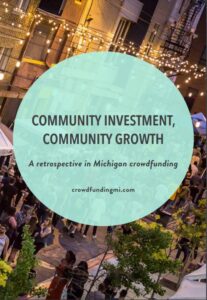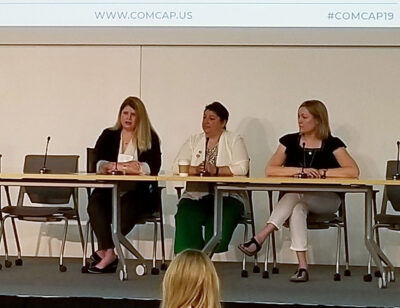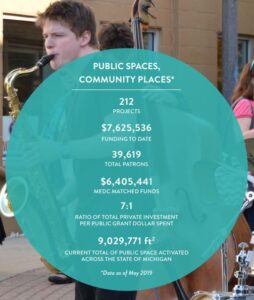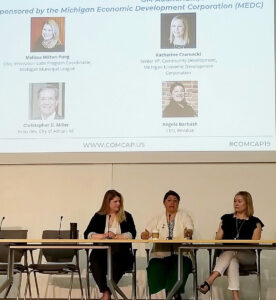
The cover for the new crowdfunding report.
The joke could start out like, “Some Boy Scouts, an artist, a curler, beer connoisseurs, and a soccer enthusiast walk into a bar with a dream to raise nearly $1.3 million.” As ridiculous as it’s sounds, it’s no joke. And two types of crowdfunding initiatives available to Michigan businesses and communities actually made it happen.
A new report being unveiled today in Detroit during a national conference of nearly 300 community capital supporters details the power of community capital strategies and tells the success stories of six specific crowdfunding examples in Michigan. The retrospective focuses on the Red Mill Pavilion in Portland, Reach Studio Art Center in Lansing, Tecumseh Brewing Co. in Tecumseh, Earthen Ales in Traverse City, The Drill Shop in Calumet Township, and Detroit City Football Club in Detroit.
The report, Community Investment, Community Growth: A retrospective in Michigan crowdfunding, tells the story of the evolution of crowdfunding, including the high fives, the hard work, and the hits and the misses. The hope is that this report becomes a learning tool that every state can use to activate a previously dormant network of community investors. It’s being released today in Detroit at the ComCap19 – the annual conference of the National Coalition for Community Capital (NC3). The conference draws upward of 400 community leaders, ecosystem builders, entrepreneurs, investors, citizens, and practitioners from across the country. View a press release about the conference here – and follow the conference – on social media using the hashtags #COMCAP19 and #communitycapital.

The League’s Melissa Milton-Pung (left) speaks during a panel discussion today at ComCap in Detroit.
Published by the Michigan Economic Development Corporation (MEDC) and Michigan Municipal League, the report is a retrospective in Michigan crowdfunding that shares case studies of community capital in action. It lays out the origins of the movement in Adrian, Michigan, the passage of the Michigan Invests Locally Exemption (MILE) Act in 2013, and then details specific crowdfunding projects in Detroit, Traverse City, Lansing, Tecumseh, Calumet Township and Portland.
This report does an exceptional job of telling the story of one our state’s best-kept secrets “how Michigan and our supporters are leaders in the nation in when it comes to crowdfunding projects making a real impact in our communities,” said Dan Gilmartin, CEO and Executive Director of the Michigan Municipal League. “With community capital, we all can play a part in making our communities better – whether it’s with our ideas, our time, our money or our networks. It all contributes to the inclusivity and opportunity we ultimately seek, and it gives us a voice and a stake in the process.”

Crowdfunding success in Michigan – by the numbers.
The report details the success of two Michigan-specific crowdfunding tools – the donation-based crowdfunding program – Public Spaces Community Places (PSCP) – and investment-based crowdfunding program for business, known as community capital investing. Donation-based crowdfunding raises money through individual donations for a specific project or initiative. Investment-based crowdfunding allows people – not just big-money accredited investors – to invest in local businesses, and these backers get a financial return on their investment.
To date, more than $14 million has been invested in 212 projects in communities through the PSCP program. With the financial backing by MEDC and support by the League, the PSCP initiative provides matching grants for crowdfunded public spaces through Detroit-based Patronicity, an online crowdfunding platform. Through the program, community members donate to support a project for a public space, such as a plaza or community garden, and the transformational idea is backed dollar-for-dollar by a grant from the state of Michigan, up to $50,000. MEDC has contributed almost $6.5 million in PSCP grants to match $7.6 million of crowdfunded donations.
The in-depth report was unveiled today during the conference at a general session at ComCap19 in Detroit “The Evolution of Community Capital in Michigan” session speakers were Melissa Milton-Pung, program manager for the Michigan Municipal League; Chris Miller, lead economic and downtown developer for the City of Adrian; Katharine Czarnecki, senior vice president of community development for the Michigan Economic Development Corporation; and Angela Barbash, principal of Revalue, a registered investment advisory firm.
“With community buy-in – both figurative and literal – donation-based and investment-based crowdfunding can fill critical gaps in access to capital for businesses and projects in all our communities,” Czarnecki said. “And Michigan is at the forefront of this community capital strategy.”

Crowdfunding panelists from left – Melissa Milton-Pung, Angela Barbash and Katharine Czarnecki.
Michigan’s PSCP program has an astounding 98 percent success rate. The program has provided $5,000 in match funding for projects as small as a bike rack program in downtown Wayne, while spurring over $105,000 in crowdfunding for projects as large as the Ultimate Trailhead in northern Michigan – both thanks to annual state funding, ease of application and leveraging Patronicity support.
The return on the state’s investment is incredible. Over $7 million of private donations have directly matched the state investment for crowdfunded projects, and these dollars have also helped leverage more than $40 million in additional resources in those communities. That is a ratio of $7.47 leveraged for every $1 of MEDC funding through PSCP.
“That’s an amazing return on the state’s investment,” Czarnecki said. “Now, we’re very excited to see other states following in Michigan’s innovative footsteps. They’re determined and ready to get to work after seeing how our communities and organizations have answered the million-dollar question: “How did you do it?”
But success is not guaranteed, the report concludes. Simply implementing these programs in other states won’t make them successful. Not all communities have the capacity and wherewithal to put these types of projects together no matter how much they believe in empowered spaces and connected places. Ideas, plans and project details often rest on the shoulders of volunteers working after-hours in community rooms. Enthusiasm and energy can wane quickly, according to the report.
“This isn’t a magic formula,” Czarnecki said. “It takes a great deal of time, effort and commitment to bring these projects to fruition. But as we’ve seen, and as this report illustrates, the efforts are well worth it.”
The report is available at the newly updated crowdfundingmi.com website. Download a pdf of the report here: http://www.crowdfundingmi.com/wp-content/uploads/2019/06/CrowdfundingRetrospective.pdf.